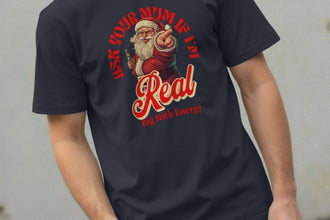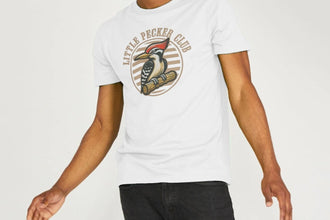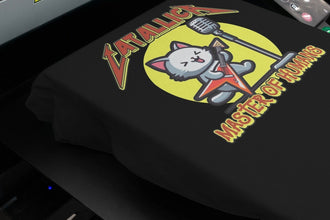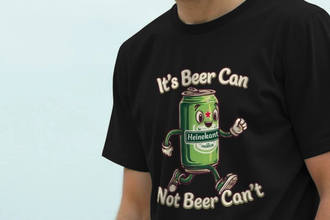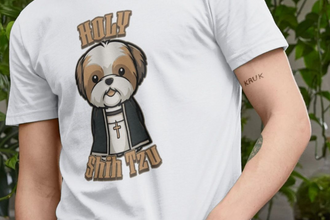
A History of British Comedy: From Music Hall to Mockumentary (And Why it All Makes Perfect Tee Sense!)
Alright, gather 'round, you lovely lot! Let’s have a right good chin wag about something near and dear to our hearts here at Teevolution – British Comedy! Yeah, that’s right, the stuff that makes you snort tea out your nose and clutch your sides with laughter. We reckon a good tee should do the same, and that’s why we’re diving deep into the hilarious history that inspires our wickedly funny designs. So, grab a cuppa, settle in, and let’s explore the glorious, often absurd, world of British humour. And remember, if this all gets a bit much, you can always take a break and browse our legendary funny T-shirts – they’re guaranteed to brighten your day!
I. Introduction: Defining British Comedy - What makes it unique? (Satire, observational humour, etc.)
What is British comedy, eh? Is it just blokes in silly wigs and dodgy teeth? Nah, mate, it's so much more than that. It's a national treasure, a cultural cornerstone, and frankly, a bloody good excuse to take the mickey out of everything and everyone – especially ourselves!
Think of it like this: British comedy is like a well-brewed pint. It's got depth, complexity, a slightly bitter aftertaste, and leaves you feeling strangely satisfied. It’s a unique blend of:
- Satire: We love to poke fun at those in power, the absurdities of societal norms, and the general state of the nation. Nothing is sacred! From politicians to pigeons, everything's fair game for a bit of gentle (or not-so-gentle) ribbing.
- Observational Humour: We're masters of finding the funny in the mundane. Think of it as spotting the comedy gold in queueing, complaining about the weather, and the baffling intricacies of British railway etiquette. It’s all about finding the universal truths in everyday absurdities.
- Self-Deprecation: Ah, now we're talking! We're experts at laughing at ourselves, our flaws, and our inherent awkwardness. We don't take ourselves too seriously, and that's what makes us so endearing (we hope!).
- Surrealism and Absurdity: Sometimes, things just get plain bonkers. Unexplained events, nonsensical situations, and characters that defy all logic – it's all part of the charm.
- Understatement: We're masters of the wry comment, the subtle dig, and the perfectly timed raised eyebrow. We prefer to hint at the joke, rather than bash you over the head with it.
- The Power of the Pun: Oh, we do love a good pun! A groan-worthy play on words can elevate a joke from amusing to legendary in our book. And as you might have guessed, we're particularly fond of them here at Teevolution, you’ll find plenty plastered all over our tees!
This unique cocktail of wit, sarcasm, and self-awareness is what makes British comedy so distinctive, so enduring, and so utterly hilarious. It’s the reason why you can find yourself laughing hysterically at something that makes absolutely no sense to anyone else.
II. Early Influences: Music Hall, Variety Shows, and Early Radio. Famous names and their impact.
To understand where British comedy is today, you gotta go back to its roots. Let's crank up the gramophone and journey back to the era of Music Hall and Variety Shows!
Imagine packed theatres, filled with working-class folk eager for a night of escapism. Music Hall was a melting pot of entertainment: singers, dancers, comedians, and novelty acts all vying for attention. It was a breeding ground for comedic talent, and many of the tropes and characters that define British humour were born here.
Think of…
- Dan Leno: A tiny dynamo of a comedian known for his physical comedy, cross-dressing routines, and relatable characters. He was a master of observational humour, finding the funny in everyday life.
- Marie Lloyd: A queen of cheeky double entendres and working-class wit. She sang songs about everyday struggles but always with a wink and a smile, subtly challenging societal norms through humour.
- George Formby: A ukulele-strumming comedian with a Lancashire accent and a knack for saucy, but innocent, lyrics. He brought a unique brand of northern charm to the stage and screen.
These performers paved the way for the next generation of comedians, influencing their style, their subject matter, and their connection with the audience.
Then came the wireless! Early radio broadcasts opened up a whole new world of comedic possibilities. Comedians could reach millions of listeners in their own homes, and new shows like "ITMA" (It's That Man Again) became national obsessions. Tommy Handley's rapid-fire delivery, catchphrases, and absurd situations captivated the nation during World War II, offering much-needed escapism during a difficult time.
These early radio shows honed the art of comedic timing, character development through voice alone, and the power of sound effects to create hilarious scenarios. They laid the foundation for the sitcoms and sketch shows that would dominate television in the years to come.
III. The Radio Golden Age: The Goon Show, Hancock's Half Hour, their surrealism and innovation.
The post-war era saw a golden age of radio comedy, with two shows standing head and shoulders above the rest: The Goon Show and Hancock's Half Hour.
- The Goon Show: This was comedy on acid (well, not literally, but you get the idea!). Spike Milligan, Peter Sellers, Harry Secombe, and Michael Bentine unleashed a torrent of surreal characters, nonsensical storylines, and outlandish sound effects. It was anarchic, chaotic, and utterly brilliant.
- Hancock's Half Hour: In stark contrast, Tony Hancock's sitcom focused on the everyday frustrations and delusions of grandeur of a working-class bloke. Hancock played a pompous, self-important character who always managed to mess things up, creating relatable and hilarious situations.
Both shows were incredibly innovative. The Goon Show pushed the boundaries of what radio comedy could be, embracing surrealism, absurdity, and experimental sound design. Hancock's Half Hour, on the other hand, perfected the sitcom format, focusing on character-driven comedy and relatable situations, it was a clear move towards the future of comedy on television.
These shows influenced countless comedians who followed, demonstrating the power of both surrealism and relatable character-driven comedy. They proved that comedy could be both intellectually stimulating and laugh-out-loud funny.
IV. Television Takes Over: Monty Python's Flying Circus, The rise of sitcoms (Dad's Army, Steptoe and Son).
Television changed everything. With the advent of moving pictures came a new wave of comedic possibilities.
- Monty Python's Flying Circus: This surreal sketch show redefined comedy for a generation. John Cleese, Michael Palin, Eric Idle, Terry Jones, Terry Gilliam, and Graham Chapman unleashed a barrage of bizarre characters, nonsensical situations, and animations that defied all logic. It was intellectual, absurd, and utterly revolutionary.
- The Rise of Sitcoms: While Python pushed boundaries, more traditional sitcoms were also flourishing. Dad's Army celebrated the bumbling patriotism of the Home Guard during World War II, while Steptoe and Son explored the dysfunctional relationship between a rag-and-bone man and his son.
These shows demonstrated the power of visual comedy, character-driven storytelling, and the ability to tackle complex social issues with humour. They paved the way for the sitcom boom of the 1970s and 80s.

V. The Alternative Comedy Boom: Challenging the status quo, social commentary. Key figures like The Young Ones, Blackadder.
The 1980s saw the rise of alternative comedy, a movement that challenged the status quo and embraced social commentary.
- The Young Ones: This anarchic sitcom followed the lives of four students sharing a house. It was loud, chaotic, and deliberately offensive, reflecting the frustrations and anxieties of a generation.
- Blackadder: Rowan Atkinson's historical sitcom poked fun at British history and institutions. With sharp writing, witty dialogue, and memorable characters, Blackadder became a cultural phenomenon.
Alternative comedy challenged the traditional norms of British humour, embracing satire, social commentary, and a more politically engaged approach. It paved the way for a new generation of comedians who were unafraid to speak their minds.
VI. The Mockumentary Era: The Office, This is Spinal Tap, Cringe comedy and its popularity.
In more recent times, the mockumentary has become a popular format for British comedy.
- The Office: Ricky Gervais and Stephen Merchant's sitcom captured the mundanity and awkwardness of office life with excruciating accuracy. The show's cringe-worthy humour and relatable characters made it a global phenomenon.
- This Is Spinal Tap: Though American, this film laid groundwork for the mockumentary. Following a fictional heavy metal band, This is Spinal Tap made comedy out of the serious world of entertainment.
Mockumentaries offer a unique blend of humour and social commentary, allowing comedians to explore relatable themes in a heightened and often uncomfortable way. The cringe-comedy trend has become a staple of British humour, reflecting our love of awkwardness and self-deprecation.
VII. Contemporary Trends: Panel shows, stand-up, and new voices in British Comedy.
Today, British comedy is thriving across multiple platforms. Panel shows like Mock the Week and QI offer a fast-paced mix of topical humour and witty banter. Stand-up comedy continues to flourish, with new voices emerging all the time. And online platforms are providing opportunities for comedians to reach new audiences and experiment with different formats.
British comedy has also become increasingly diverse, with more women, people of colour, and LGBTQ+ comedians gaining prominence. These new voices are bringing fresh perspectives and challenging traditional norms, ensuring that British comedy remains relevant and engaging for years to come.
VIII. Conclusion: The enduring legacy and future of British Comedy.
From the Music Hall to mockumentaries, British comedy has a rich and varied history. It's a tradition built on satire, observational humour, self-deprecation, and a healthy dose of absurdity. It also heavily informs and inspires our quirky, funny T-shirts here at Teevolution!
British comedy continues to evolve, adapting to new platforms, embracing new voices, and challenging traditional norms. But one thing remains constant: its ability to make us laugh, think, and see the world in a slightly different way.
So, the next time you're looking for a good laugh, remember the rich history of British comedy. And if you want to wear your humour on your sleeve (literally!), head over to Teevolution and check out our collection of witty, cheeky, and planet-friendly T-shirts. Because as we always say, life's better with a laugh, and a truly great tee! Cheers to that! Now, if you'll excuse me, I'm off to find a pun about a stapler...it's bound to be somewhere around here!






